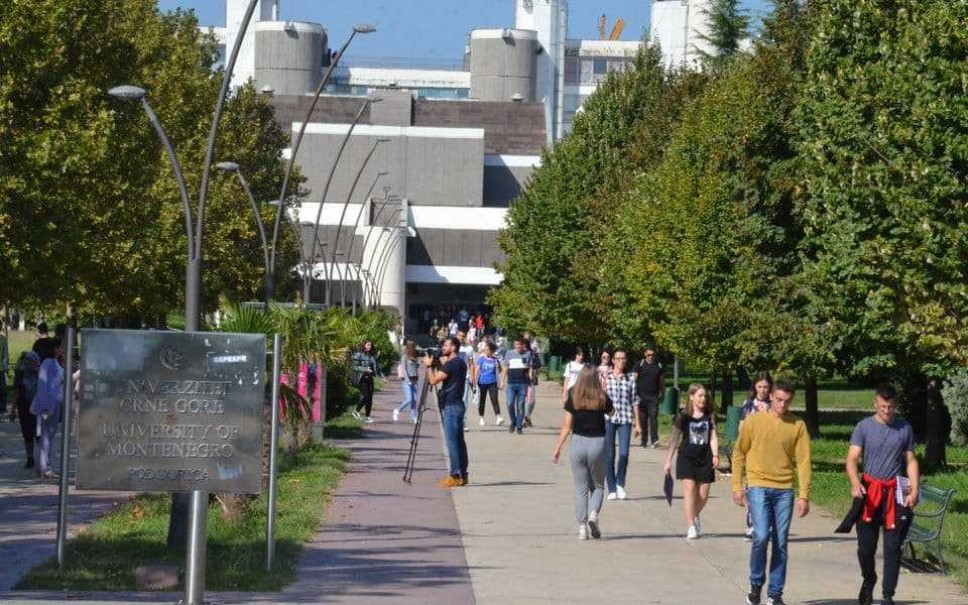Student Mobilities Function Seamlessly

Uncertain epidemiologic and health situation has made a great impact on student exchange programmes. Despite that, the University of Montenegro has successfully adjusted to new circumstances and, in cooperation with world partners, offered models for enabling seamless mobilities.
The changes included moving classes to the virtual platform and depending on the country, students could also choose combined classes that included the organization of teaching in the classroom and online - Nikolina Radulovic from International Relations Office said for Pobjeda.
Radulović explains that the pandemic had a direct impact on exchange programmes, but also improved the digitalization process of the University of Montenegro.
Mobilities became virtual and therefore students were enabled to simultaneously participate in courses and programmes and attend combined classes of other universities and their home university - Radulovic said.
The head of the National Erasmus Plus Office in Montenegro, Vanja Drljevic, confirms that thanks to offered alternative solutions, exchange programmes function seamlessly. She explains that students, who found themselves at one of the European universities upon a pandemic outbreak, could choose to stay there or return to Montenegro.
Based on research conducted by the European Commission on student mobility, 42 % of students decided to stay at host universities, while about 40 % decided to return to their home country - Drljevic said.
A great number of universities, as she adds, offered students to continue mobility online, but there were cases when students gave up on scholarships.
Support
Successful implementation of programmes, as Radulović emphasizes, requires cooperation between all sides so as to provide students with all necessary information during the application and mobility process.
The most important thing for students is to know that they can count on the help of home and host universities – their coordinators and offices for international cooperation - Radulovic added.
Drljevic agrees, explaining that the support given to students during the pandemic is of great importance.
During mobility, students faced many challenges when it came to acquiring a visa, as well as providing transport for the return to their home country - Drljevic said.
For that reason, she says, the National Erasmus Plus Office organized many webinars dedicated to providing necessary information and enabling the implementation of started mobilities.
She also mentioned that according to the European Commission research data, participants are mostly (58%) satisfied with communication with higher education institutions abroad.
The communication reflects in timely answers to inquiries and providing information about relevant questions regarding current health measures and travel restrictions - Drljevic concluded.
Offer
Our respondents said that the offer of exchange programmes is no less than last year and all agreements are automatically extended for next year.
Radulovic emphasizes that the health crisis period is used for establishing new cooperation with higher education institutions and intensifying already existing ones. That resulted in an increased number of bilateral agreements that enable students to participate in exchanges and spend part of their studies at international universities.
In the summer semester of 2020/2021, The University of Montenegro has announced 62 calls for 242 student mobilities and 185 teaching and non-teaching staff mobilities. We received 120 student applications, but we expect more, having in mind that some application calls are still open - Radulovic said.
On the other hand, Drljevic explains that the students’ interest in exchange at the beginning of the pandemic has decreased, so a bigger number of unused mobilities has been left.
The tendency has changed and it is still changing, so we witness a great interest for exchange despite difficult circumstances caused by the pandemic. - Drljevic said.
Exchange programmes are continued, Drljevic concludes, thanks to the decision of the European Commission, according to which all projects are extended for another year so as to use more opportunities provided by the agreements.
Student exchange as a way of returning to normality
A great strive for professional development and studying abroad prevailed among students who decided to use exchange programmes during the pandemic.
Danilo and Damjan Nikcevic were one of those students. They are spending a semester at University in Cadiz, Spain, where the classes are combined – one week they have classes at faculties, while others are online.
The University is well organized. There is an application that gives us the necessary information about subjects. Probably, there are shortcomings compared to the pre-pandemic situation, but, undoubtedly, by following the measures, we can have a normal student life outside - Danilo and Damjan Nikcevic said.
Vladana Celebic attends Malardalen University in Sweden. The reason she applied for student exchange was the wish to experience student life abroad and meet new culture, environment, and education policies. She explains that the situation in Sweden is way more different than in Montenegro.
People are more socially responsible, so everything works based on the recommendations given by the government. The recommendations include avoiding crowds, gatherings, wearing masks. The situation is stable and the University is open for all students who want to spend time in the library – Celebic said.
For Anja Spaic, an exchange student at Charles University in the Chez Republic, leaving for studies abroad during a pandemic despite all restrictions was some kind of return to normality and it gave her the possibility to get away from the routine.
The situation is not quite good for a while now and the classes are held online. It was hard to get a visa and find transport to the destination because many flights were canceled. It is different from what we used to and more organization and planning is necessary, but it is not impossible - Spaic said.

